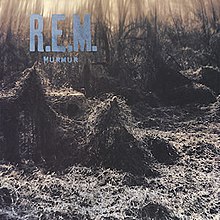Murmur (album)
| Murmur | ||||
|---|---|---|---|---|
 |
||||
| Studio album by R.E.M. | ||||
| Released | April 12, 1983 | |||
| Recorded | January 6 – February 23, 1983 | |||
| Studio | Reflection Studios, Charlotte, North Carolina, United States | |||
| Genre | ||||
| Length | 44:11 | |||
| Label | I.R.S. | |||
| Producer | ||||
| R.E.M. chronology | ||||
|
||||
| Singles from Murmur | ||||
|
||||
| Professional ratings | |
|---|---|
| Review scores | |
| Source | Rating |
| AllMusic | |
| Blender | |
| Chicago Tribune | |
| Entertainment Weekly | A |
| Pitchfork Media | 10/10 |
| Q | |
| Rolling Stone | |
| The Rolling Stone Album Guide | |
| Uncut | |
| The Village Voice | A− |
Murmur is the debut studio album by the American alternative rock band R.E.M., released on April 12, 1983 by I.R.S. Records. Murmur drew critical acclaim upon its release for its unusual sound, defined by lead singer Michael Stipe's cryptic lyrics, guitarist Peter Buck's jangly guitar style, and bass guitarist Mike Mills' melodic basslines.
R.E.M. started recording their debut album in December 1982. I.R.S. paired R.E.M. with producer Stephen Hague, who had a higher profile than the band's previous producer Mitch Easter. Hague's emphasis on technical perfection did not suit the band; the producer made the group perform multiple takes of the song "Catapult", which demoralized drummer Bill Berry. Also, Hague took the completed track to Synchro Sound studios in Boston and added keyboard parts to the track without the band's permission and to their dismay. Unsatisfied, the band members asked the label to let them record with Easter. I.R.S. agreed to a "tryout" session, allowing the band to travel to North Carolina and record the song "Pilgrimage" with Easter and producing partner Don Dixon. After hearing the track, I.R.S. permitted the group to record the album with Dixon and Easter.
R.E.M. entered Reflection Studios in Charlotte, North Carolina in January 1983 to begin recording sessions with Easter and Dixon. Much of the band's material for the album had been tested on preceding tours. Because of its bad experience with Hague, the band recorded the album via a process of negation, refusing to incorporate rock music clichés such as guitar solos or then-popular synthesizers, in order to give its music a timeless feel. Berry in particular was resistant to "odd" musical suggestions, insisting that his drums be recorded in a drummer's booth, a practice that was antiquated at the time. Dixon and Easter took a hands-off approach to much of the recording process. The pair would only fix up a vocal track or ask lead singer Michael Stipe to re-record a vocal if it was very substandard.
...
Wikipedia
